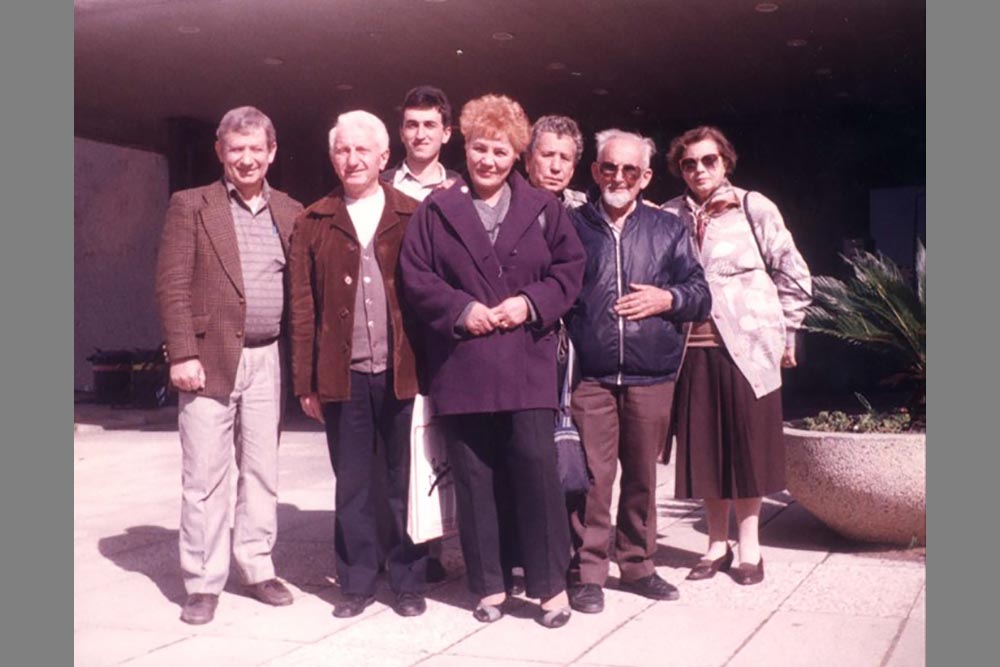Bank of Portraits / Bukovsky Ivan and Hanna and their daughters Liubov and Nadiia

Bukovsky Ivan and Hanna, Hanovska (Bukovska) Liubov, Shymchenko (Bukovska) Nadiia
During the Second World War, Ivan and Hanna Bukovsky lived in the village of Khrinnyky in the Rivne region. The family had eight children.
In the first months of occupation, Germans tried to be careful about treating the Ukrainian population. The main repressions were directed against Jews, who were resettled from the surrounding villages to the northern outskirts of Demydivka. The ghetto was fenced with barbed wire, though the regime was not very strict. Ukrainians could bring the prisoners food and visit them on business, as there were many tailors and shoemakers among the Jews. Later, the occupants restricted the free movement of the population. Some Jewish families managed to escape from the ghetto and arrange hiding places in the Khrinnyky forests. But even there, some of them were killed.
In the spring of 1942, a forester, Ivan Bukovsky, was driving a wagon and saw a stranger in the forest. She was running with a girl toward him and screaming loudly. He stopped to find out what had happened. The woman's name was Henia Shvartsman. The Shvartsman family, with their seven-year-old daughter and three-year-old son, were hiding in the woods for six months. There were other Jews in hiding nearby. However, the Germans shot all of them, as well as Hanna’s husband and little son, during a raid.
"She felt that she could trust this man. When my father returned home, he told my mother, his sister, and her husband about everything. When it got dark, they took shovels and went to the forest. First of all, they buried the dead, and then they dug new dugouts, put hay into them, and left Genia and the child there. This shelter was on the edge of the forest, not far from our house." From the testimony of Sofiia Andrzejkowicz, a daughter of the Bukovskys.
The Bukovskys took care of this family, sending their eldest daughters to them every day with food and water. However, the troubles did not stop. One of the locals saw clothes drying in the woods, and people in the village began to talk about the fugitive Jews. Being afraid that the hiding place would be discovered, Ivan and Hanna decided to take Hania and her daughter to their house.
In the spring of 1942, a forester, Ivan Bukovsky, was driving a wagon and saw a stranger in the forest. She was running with a girl toward him and screaming loudly. He stopped to find out what had happened. The woman's name was Henia Shvartsman. The Shvartsman family, with their seven-year-old daughter and three-year-old son, were hiding in the woods for six months. There were other Jews in hiding nearby. But all of them, as well as Hanna's husband and little son, were shot by the Germans during a raid.
"She felt that she could trust this man. When my father returned home, he told my mother, his sister, and her husband about everything. When it got dark, they took shovels and went to the forest. First of all, they buried the dead, and then they dug new dugouts, put hay into them, and left Genia and the child there. This shelter was on the edge of the forest, not far from our house." From the testimony of Sofiia Andrzejkowicz, the daughter of the Bukovskys.
The Bukovskys took care of this family, sending their eldest daughters to them every day with food and water. But the troubles did not stop. One of the locals saw clothes drying in the woods, and people in the village began to talk about the fugitive Jews. Being afraid that the hiding place would be discovered, Ivan and Hanna decided to take Hania and her daughter to their house.
"And then my father and mother sent me and my older sister to the forest: "Children, run quickly and tell these people that as soon as it gets dark, they must come to our house immediately." When they came, our mother washed them, gave them her clothes, fed them, and put them to bed. In the morning, my parents decided to arrange a hiding place for them. There was hay in the barn. My parents cut out the hay and made a hollow where our survivors hid for a while, and we, the children, brought them food. Our mother was watching that nobody came to us, that other children did not run in, or that the neighbors did not see Jews." From the testimony of Sofiia Andrzejkowicz, the daughter of the Bukovskys.
But one day something unexpected happened: the Germans came to the Bukovsky's yard in wagons to get hay for their horses. The lives of the rescuers and their children hang in the balance.
"My older sisters ran away, and my mother took my little brother in her arms, and my sister Polina and I stood next to her. My mother was crying because she knew that death came to our yard. She was telling the Germans something, asking them, but they did not understand anything. I knew that the neighbor across the street was a teacher of German and always called me "Kleine Kinder". So I ran to him. After having a conversation with the neighbor, the Germans left our house." From the testimony of Sofiia Andrzejkowicz, daughter of the Bukovskys.
After the war, Henia and Polina Shvartsman emigrated to Israel, but they always remembered their rescuers and kept in touch. In 1992, at their invitation, members of the Bukovsky family visited Israel. And in 1994, Ivan and Hanna Bukovsky and their eldest daughters, Liubov and Nadiia, were recognized by Yad Vashem as Righteous Among the Nations.
Svitlana Demchenko
Kyiv
The National Museum of the History of Ukraine in the Second World War
-
fingerprintArtefacts
-
theatersVideo
-
subjectLibrary


.jpg)

